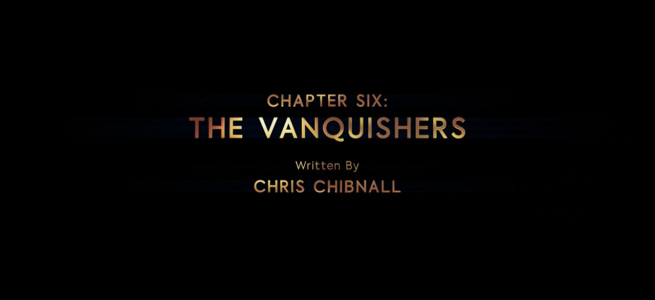Doctor Who: Flux
“Chapter Six: The Vanquishers”
Series 13, Episode 6
Written by Chris Chibnall
Directed by Azhur Saleem
Starring Jodie Whittaker, Mandip Gill, and John Bishop
Guest Starring Nadia Albina, Jacob Anderson, Craige Els, Barbara Flynn, Thaddea Graham, Johnny Mathers, Kevin McNally, Steve Oram, Craig Parkinson, Jemma Redgrave, Rochenda Sandall, Annabel Scholey, Sam Spruell, Dan Starkey, and Jonathan Watson
60 minutes
Original broadcast 5 December 2021
1. Go!
This is the end.
Or is it?
Doctor Who: Flux concludes bang, bang, bang . . . and with nary a whimper in sight.
“The Vanquishers” is the fittingly titled, sixth-and-final chapter of Series 13’s ambitious serial. Although this installment may not quell all doubts about writer and showrunner Chris Chibnall’s ability to engineer a pleasing resolution to Flux, it still fulfills more of Flux’s promise than I thought possible.
My review of Chapter Five (“Survivors of the Flux”) anatomizes the storytelling challenges that Chibnall faces in Chapter Six, principally that Flux includes more characters, events, themes, and symbols than he can possibly pay off given Series 13’s abbreviated episode count.
Even if we include the three specials already commissioned by the British Broadcasting Corporation (BBC) for 2022 (New Year’s Day’s “Eve of the Daleks”; Easter 2022’s “Legend of the Sea Devils”; and Autumn 2022’s BBC Centenary Special, “The Power of the Doctor”), Chibnall’s nine opportunities to bring his era of Doctor Who to graceful completion are scant even by the BBC’s short-season standards.
“The Vanquishers” solves—or attempts to solve—this problem by moving at breakneck speed through scenes and sequences of undeniable complexity and visual power that force viewers to pay heed to every precious moment of screen time. Russell T. Davies and Steven Moffat preferred this accelerated tempo during their days as New Who’s showrunner, but Chibnall’s embraced it with almost reckless abandon, sometimes leaving his episodes, his characters, and his audiences all gasping for breath as they race to each entry’s finish line. Doing so makes the journey exciting even as it distracts viewers—momentarily, perhaps, but only momentarily—from inadequacies creeping into the narrative.
Yes, this pell-mell rush is an old storyteller’s trick, but the question that “The Vanquishers” confronts is, simply, how well does Chibnall deploy it to end Flux on high—rather than low—notes?
The answer, dear reader, is more inspiring than you might imagine.
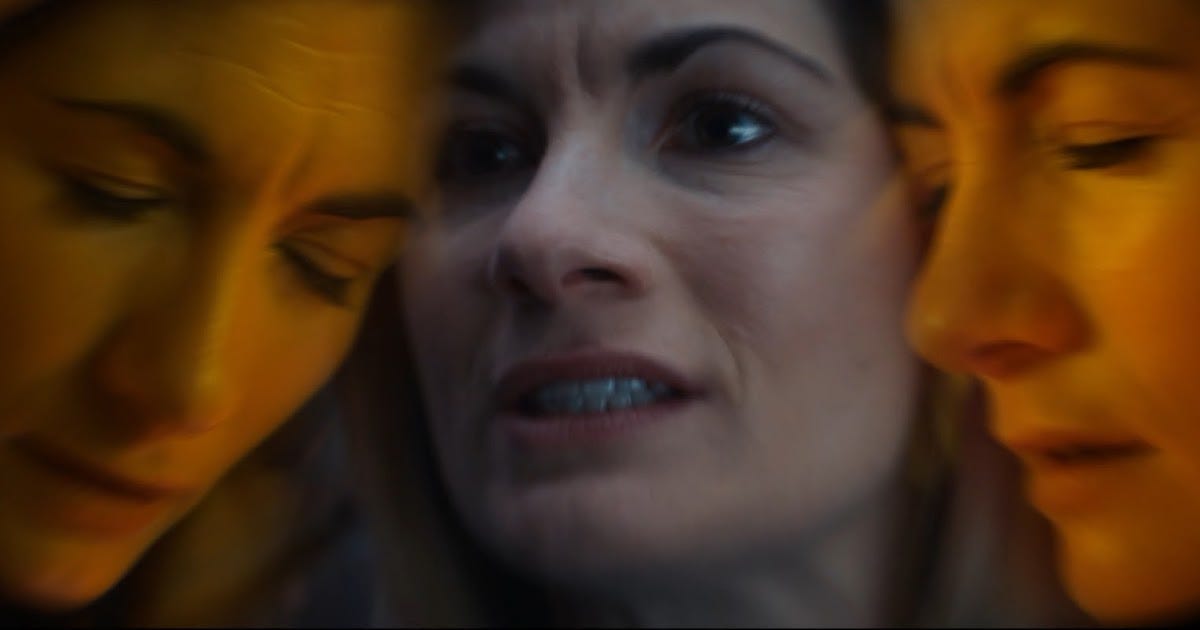
2. Stop!
Even cursory viewings of “The Vanquishers” make clear that Chibnall’s imagination was going full throttle when writing Chapter Six’s teleplay. He jumps from place to place, character to character, and theme to theme adroitly enough that viewers (or, at least, this viewer) can forgive his tendency to organize Chapter Six around cliffhangers that, as often as not, build false drama that we know will be resolved the moment “The Vanquishers” returns to a previous location.
This recursive structure cannot, paradoxically enough, diminish the episode’s forward momentum, which in some scenes threatens to go straight off the rails and in others permits Chibnall to reward his cast with poignant exchanges that counteract the reams of expository dialogue they hurl at one another.
These judgments shouldn’t minimize the pleasures of cliffhanger fiction, either, since such narrative peaks are crucial to the success of every good thriller, whether in print, on stage, or on screen. In “The Vanquishers,” however, Chibnall’s choice to fill Flux’s first five chapters with so much material requires him to adopt a punishing pace that can’t always control the contending events, developments, and characters he sets in motion.
Those stretches where “The Vanquishers” pauses to consider the emotional complications evoked by the Flux’s success (in annihilating whole swathes of the universe) become, by contrast, more significant than they might otherwise be. This result permits every actor to shine, however briefly, in an entry that, frame by frame, contains more fine performances than any previous Flux installment.
Chibnall also takes a substantial risk by having the Thirteenth Doctor (Jodie Whittaker) captured twice, not only by the Sontarans as they pursue their plan to dominate the entire universe after allying themselves with the Cybermen and the Daleks, but also by Azure (Rochenda Sandall) and Swarm (Sam Spruell), the sibling Ravagers whose quest for revenge against the Doctor long ago passed the point of madness. Being confined to two different cages might seem to jeopardize the Doctor’s ability to manage events (by turning her into a passive observer rather than an active participant), but, as all longtime Whovians know, the Doctor is never powerless if she retains the ability to speak.
And speak she does, incessantly, thanks to an absurd narrative trick that Chibnall concocts. The Doctor, you see, is simultaneously taken hostage by the Sontarans (who remain inside our universe) and by the Ravagers (who occupy the Division space station located in the Void that exists outside that universe). This clever bit of time-travel hokum is no crazier than the temporal shenanigans that Davies and Moffat invented to get the Doctor out of impossible predicaments, fitting quite comfortably into New Who’s tradition of crazy solutions to insane problems.
Swarm, who murdered Division’s leader Awsok/Tecteun (Barbara Flynn) at the conclusion of Chapter Five (by disintegrating her with a touch of his hand), manages to pat the Doctor’s head just as she removes the “conversion plate” that allows her to remain safely aboard the Division space station responsible for generating the Flux. Doing so splits the Doctor into three different versions of herself (or “trisects” her, to employ the Doctor’s language). One self remains aboard the space station, while the other two travel elsewhere.
Yes, friends, Chibnall decides that the Doctor may exist in all three places at once because Flux’s plot demands that she must. Doctor Who (Old and New) has endorsed such inventive flimflam since 1963, making this trisection one of franchise’s most enjoyable tomfooleries.
To recap, one version of the Doctor appears on the ship that Lupari warrior Karvanista (Craige Els) commandeered from Bel (Thaddea Graham) in “Survivors of the Flux,” while the second version makes her way to the subterranean tunnels that business magnate Joseph Williamson (Steve Oram) dug underneath 19th-Century Liverpool, England. This locale sees the Doctor finally reconnect with Professor Eustacius Jericho (Kevin McNally), whom she first encountered in Chapter Four (“Village of the Angels”), as well as with her two companions, Dan Lewis (John Bishop) and Yasmin “Yaz” Khan (Mandip Gill).
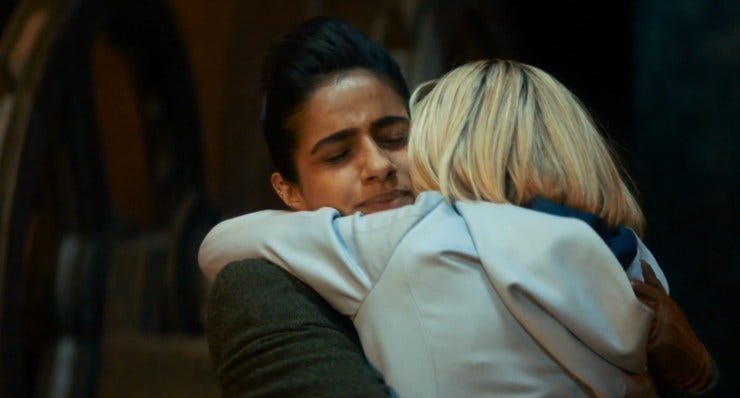
When the Doctor and Yaz see each other after their long separation (for Yaz, three years have elapsed), their mutual affection surges like a dam that’s burst. So powerful is this scene that no viewer can doubt how much the Doctor and Yaz care for one another, so I wish that Chibnall’s script and Azhur Saleem’s brisk direction had dilated these moments, permitting them to last longer than four or five seconds, even if Whittaker and Gill, in a triumph of screen acting, make every second count.
“The Vanquishers,” as such, may be better than expected in wrapping up Flux’s sprawling plot, but this installment’s relentless velocity stops its characters from living and breathing as passionately as they should. This problem dogs the episode from start to finish, but, fortunately for us, Chibnall and his collaborators so skillfully construct Chapter Six that it succeeds despite these flaws.
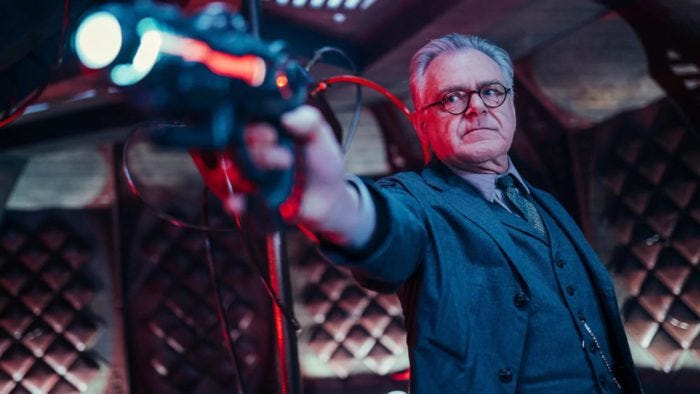
3. Run!
The Doctor’s divided selves give Jodie Whittaker the opportunity to play multiple versions of her whip-smart protagonist, three times the usual amount, in fact, which seems a fair bargain for an entry that rushes hither and yon. From commenting upon how cute her counterparts are to turning the Sontarans’ plan (to betray their allies) against them, Whittaker commands, bluffs, and inveigles with the same deft, glint-in-her-eye sparkle that’s characterized her performance since Series 11’s opening episode, “The Woman Who Fell to Earth.”
Mandip Gill, as always, invests Yaz with the intelligence, empathy, and pluck that makes her among my favorite New Who companions (from any era). Whether helping herself, Dan, Jericho, and Williamson escape Sontaran soldiers while yelling “We’re never defenceless!” or making the Doctor explain (rather than just spout) technobabble, Gill is so good that I wish she were more prominently featured here. “The Vanquishers” includes such a crowded field of characters that, apart from the Doctor, no one receives much screen time, but the Thirteenth Doctor’s longest-serving companion deserves better, especially since her time aboard the TARDIS will end when Thirteen departs at the Centenary Special’s conclusion.
John Bishop, amiable as always, plays Dan as a man more secure in his tasks as companion after three years crisscrossing the globe with Yaz and Jericho. As he tells the Doctor about Yaz, “She was amazing. She is amazing,” which, while true enough, would be nice to see in greater detail. Everyone’s favorite Scouse remains a charming and welcome character, which is the best testament to Bishop’s good work in a role that’s only been part of New Who’s principal cast for six episodes.
The tendency to show rather than tell, or, in the case of “The Vanquishers,” to show as much as it tells, remains one of Chibnall’s authorial inclinations that scenes like the Doctor’s reunion with Yaz and Dan cannot preempt. Chapter Six, indeed, includes so many reunions—Bel finds Vinder (Jacob Anderson), Dan reconnects with Diane (Nadia Albina), Jericho again sees Claire Brown (Annabel Scholey)—that they risk becoming routine rather than joyful. Why? This outing’s frazzled pace is the culprit. Chibnall’s mission to resolve most of Flux’s loose ends precludes him from slowing down to allow his characters sufficient space to celebrate their victories.
Still, seeing Vinder and Jemma Redgrave’s formidable Kate Lethbridge-Stewart give Craig Parkinson’s oleaginous Grand Serpent a generous helping of poetic justice helps offset Chapter Six’s blemishes. Plus, Jericho gets one of the best death scenes in all New Who, when, trapped aboard a Sontaran vessel about to be destroyed by the Flux shockwave, he discovers that he cannot teleport away.
As he confronts a Sontaran soldier bent on executing him, Jericho utters these terrific lines (written for him by Chibnall): “I, sir, am Professor Eustacius Jericho, Scourge of Scoundrels! I wish I’d written that autobiography. What a good title.” Kevin McNally is fabulous here, as he has been throughout his three Flux appearances, delivering Jericho’s final words (“what an awfully big adventure”) with the same curiosity, bravery, and resolute English reserve that causes the Doctor, in “Village of the Angels,” to call him a “proper scientist.”
Jericho is the only fatality that Flux’s expanded Team TARDIS sustains. Casualties are foregone conclusions in a storyline that nearly obliterates the universe, but we might expect Jericho’s loss to register more forcefully with Yaz and Dan than it does. Chibnall, however, must keep events moving at a hasty clip, which at least treats us to the sight of two Doctors aboard the TARDIS once “The Vanquishers” enters its final act. And, in a narrative coup, Chibnall allows Diane, the Museum of Liverpool employee who caught Dan’s eye in “The Halloween Apocalypse,” to provide the crucial suggestion for ending the Flux once and for all.
Azure has trapped Diane inside Passenger (Jonny Mathers), the living container whose endless interior landscapes—in feats of dimensional engineering as impressive as the TARDIS being bigger on the inside—offer infinite space to imprison whomever and whatever Passenger’s operator desires. Yet Diane escapes by shrewdly observing Passenger’s inner workings and then reasoning her way out, equipping her to recommend that the Doctor utilize Passenger’s limitless matter to counteract the antimatter eddies that, in one of New Who’s most impressive visual-effects shots, ripple through deep space after the Flux shockwave razes the Cybermen, Dalek, and Sontaran fleets. The Doctor shouts, “Hoover up that Flux for us!” in an exciting resolution helped along by composer Segun Akinola’s marvelous music.
Yes, it’s thrilling.
Yes, it’s silly.
Yes, it’s mad.
Yes, it’s somehow and someway perfect.
In other words, textbook Doctor Who.
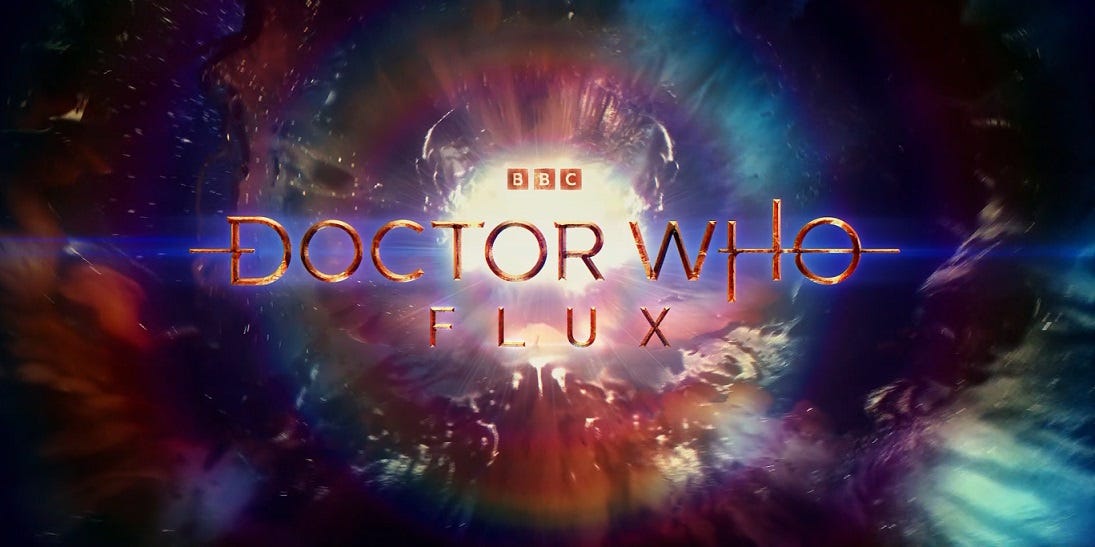
4. Fly!
“The Vanquishers” includes other nuggets so tantalizing that expanding this episode to 90 minutes (or even two hours) would improve Flux’s final chapter. Karvanista, for instance, reveals that he was once the (Fugitive) Doctor’s most loyal companion. Craige Els is excellent when, as Karvanista, he wistfully tells the Doctor, “There was a time I’d do anything for you. But you left me. I put the whole universe between us, then you come crashing back in as if nothing had ever happened.”
Who wouldn’t want to hear more of this conversation? Yet, thanks to the constraints imposed by Chapter Six’s sixty-minute running time, the Doctor can only reply, “I don’t have those memories,” which, no matter how one measures it, is a slap in the face to a character whose bravery proves crucial to the Doctor successfully vanquishing the Flux.
Even so, this theme—of the Doctor leaving behind companions who can only mourn their loss—is among Flux’s and New Who’s most powerful, going straight back to Russell T. Davies’s era. See, especially, Series 1’s spectacular two-part finale (“Bad Wolf” / “The Parting of the Ways”), Series 2’s “School Reunion,” and Donna Noble’s (Catherine Tate’s) final arc in Series 4 (i.e., its three remarkable concluding episodes, “Turn Left” and the wondrous two-part finale, “The Stolen Earth” / “Journey’s End”).
Steven Moffat explored this premise when bidding farewell to each one of the Eleventh (Matt Smith’s) and Twelfth Doctors’ (Peter Capaldi’s) companions, with Series 7’s “The Angels Take Manhattan” and “The Snowmen,” Series 9’s masterful “Face the Raven” and “Heaven Sent,” and Series 10’s “Twice Upon a Time” all meditating upon the grief that the Time Lord and his companions feel when their journeys together reach their inevitable ends.
Series 13 is no different, with the threat of such separation undergirding Flux from its opening sequence. Right at the start of “The Halloween Apocalypse,” Yaz scolds the Doctor for not sharing more of her vast life experience with her friends (echoing statements made by Tosin Cole’s Ryan Sinclair and Bradley Walsh’s Graham O’Brien during Series 11 and 12, especially the latter’s “Fugitive of the Judoon”).
Chinball returns to this notion in every subsequent Flux chapter, often subtly, but, when “The Vanquishers” reaches its penultimate scene, the Doctor finally apologizes for her reticence. “I want to tell you everything,” the Doctor promises Yaz. Let’s hope at least one of Jodie Whittaker’s final appearances will dramatize this conversation, but given Chibnall’s penchant for writing the Thirteenth Doctor as an increasingly secretive and closed-off friend after discovering that she is, in fact, the Timeless Child, we shouldn’t count on this exchange coming to pass.
Then there’s the tiny matter of the universe’s status as Flux winds down its final minutes. Karvanista, Vinder, and Bel return to their Lupari vessel so that they can—I guess?—explore what’s left of creation. This scene, although well played by Craige Els, Jacob Anderson, and Thaddea Graham, remains incredibly odd given that the Sontarans earlier exterminate all other Lupari, leaving Karvanista the last member of his species (itself a longstanding New Who theme).
One might imagine that Karvanista’s grief over this outcome would eclipse making jokes about how he wished he’d never saved Dan Lewis’s life, but since no one explicitly states that the Doctor reverses the Flux’s effects, most of the universe must still lie in ruins. Vinder even says that he, Bel, and Karvanista can pick up work (perhaps by helping the Flux’s survivors rebuild their lives?), but “The Vanquishers” isn’t, as far as I can tell, a reset-button episode in which the Doctor erases all signs of trouble.
This aftermath is dramatically preferable to its opposite even if Chapter Six’s final moments downplay the Flux’s staggering consequences. The best we can say about this oversight on Chibnall’s part is that it may not be an oversight at all. The Thirteenth Doctor’s three additional installments give her time 1) to manage the Flux’s widespread annihilation, 2) to mitigate its effects as much as possible, or 3) to find ways to reverse them. Unless incoming showrunner Russell T. Davies wishes to inherit a New Who cosmos so wounded that the Fourteenth Doctor must repair its damage, I presume Chibnall will undo these losses before the Thirteenth Doctor exits once and for all.
This likelihood may also explain why the final ten minutes of “The Vanquishers” mimic significant aspects of the Tenth Doctor’s (David Tennant’s) final adventures. The sight of two Doctors on board the TARDIS, solving the crisis before them while standing amidst numerous companions, recalls those glorious concluding minutes of Series 4’s “Journey’s End,” where the Tenth Doctor watches his companions from Series 1, 2, 3, and 4 fly the stolen Earth back to its proper location in our solar system. Moreover, this installment’s villain, the Daleks’ creator Davros (Julian Beach), tries to detonate a “Reality Bomb” that, like the Flux, is deadly enough to destroy all creation.
More worrying, however, is the message that the Thirteenth Doctor receives from Time itself when the Ravagers return her to the Temple of Atropos. Since their first appearance in “The Halloween Apocalypse,” Azure and Swarm have struggled to free Time from the shackles constraining it, but the Doctor’s success in extinguishing the Flux shockwave so upsets Time that it murders both siblings.
Considering how dangerous they have been throughout Flux, Chibnall takes the easy way out by having their patron, Time, execute Azure and Swarm for failure. One detail, however, is significant. Azure beatifically utters the word “Ascension” just before she disintegrates, which faithful New Who viewers recall as the Time Lord President Rassilon’s (Timothy Dalton’s) mad plan (i.e., the Time Lords will transcend their corporeal forms and ascend into beings of pure consciousness) in Tennant’s swan song, “The End of Time: Part Two.”
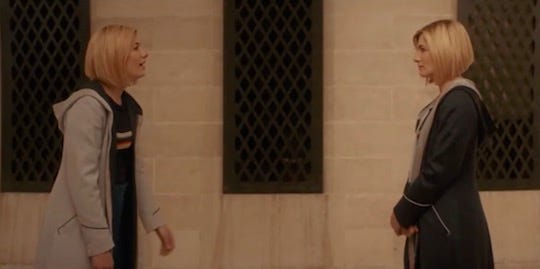
Time then re-integrates the Doctor into a single person after saying, “But you won’t outrun me. Your time is heading to its end. . . . Beware of the forces that mass against you. And their Master.” These words remind us of the disturbing prophecy that the psychic Carmen (Ellen Lewis) makes in 2009’s Easter Special (“Planet of the Dead”), where she tells the Tenth Doctor, “your song is ending, sir. . . . It is returning through the dark. And then Doctor—oh but then—he will knock four times.”
Time’s portents spell doom for the Thirteenth Doctor, no doubt at the hands of Sacha Dhawan’s Spy Master. Although Time replies “no” when the Doctor asks if “my reckoning” is upon her, such penance is now inevitable, if not in “Eve of the Daleks” and “Legend of the Sea Devils,” then certainly in the Centenary Special.
The Tenth Doctor’s regeneration results from his hubris in declaring himself “the Time Lord Victorious” during November 2009’s “The Waters of Mars,” so Chibnall, by ending “The Vanquishers” with Time’s prophecy, suggests that Doctor Thirteen must atone not only for allowing the Ravagers and Division to create the Flux but also for unwittingly inspiring their actions.
If I were to guess, the Centenary Special will see the Thirteenth Doctor sacrifice her life to restore the universe to pristine condition, perhaps mortally wounding herself while putting the Flux’s destruction right or depleting herself while struggling to unlock her memories of the Timeless Child (or both). My predictions rarely come true, but Chibnall ends Flux with the Doctor weeping a single tear as she contemplates Time’s prophecy. Why echo the Tenth Doctor’s fate, even elliptically, if not to imply that Thirteen will depart in similar fashion and for similar reasons?
Time, of course, will tell, but, for now, rest easy in knowing that “The Vanquishers” and Doctor Who: Flux are better than some online commentators have proclaimed. Both, indeed, are best described as “qualified successes.” Chibnall swings and swings and swings, but only occasionally misses, making his batting average better than anticipated. Yet I still wish Chibnall had devoted Series 13 to Yaz and the Doctor enjoying fun escapades with new aliens, on new planets, inside history itself. Flux is a busy, barmy, and brassy tale that, in the end, remains too much to handle or contain.
This last judgment describes so many Doctor Who episodes and seasons that Chibnall, his cast, and his crew can (and should) feel proud of their accomplishments in bringing Series 13 to the screen. This serial’s lapses, after all, make its splendors all the more precious, which, for me, becomes as fitting a place as any to conclude these reviews of Doctor Who: Flux.




